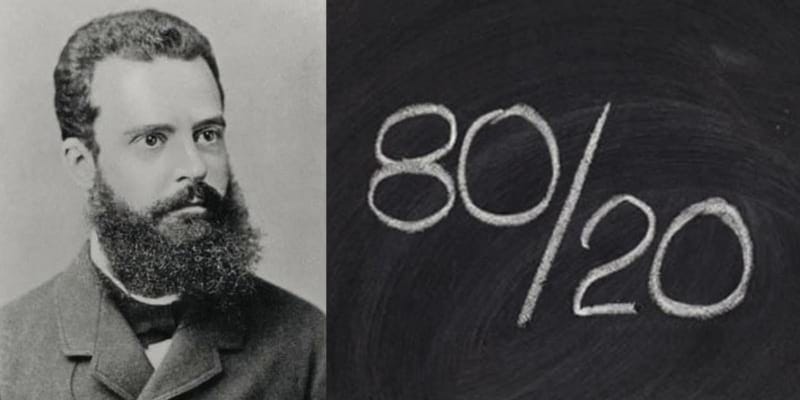Vilfredo Pareto: The Hidden Truth About Revolutions & The Circulation of Elites
Ever felt like history repeats itself? Like the more things change, the more they stay the same? Well, you're not alone. For over a century, thinkers have grappled with this very question. And few have provided a more compelling, albeit unsettling, answer than Italian sociologist and economist Vilfredo Pareto. He wasn't interested in flowery ideals or utopian dreams. He was fascinated by the hard, cold reality of power. And what he saw, well, it might just change how you view the world around you.
The 80/20 Rule and the Seeds of Inequality
You might already be familiar with Pareto, even if you don't know his name. He's the guy behind the 80/20 rule, also known as the Pareto Principle. This principle states that roughly 80% of effects come from 20% of the causes. Think about it: 80% of your sales come from 20% of your customers; 80% of your work is accomplished in 20% of your time. Pareto originally observed this in the distribution of wealth, noticing that a small percentage of the population controlled the majority of the resources.
But Pareto's observations went far beyond simple economic distributions. He saw this inequality as a fundamental aspect of human societies, a driving force behind social dynamics. He didn't necessarily *like* it, but he accepted it as a constant.
The Circulation of Elites: A Dance of Power
Pareto's most significant contribution, however, lies in his theory of the "Circulation of Elites." This is where things get really interesting... and perhaps a little cynical. He argued that society is always and inevitably ruled by a minority: the elite. This elite, according to Pareto, doesn't *eliminate* with revolution, it simply *changes*. The underlying structure of power persists. Sounds a bit bleak, doesn't it?
So, what does this "circulation" look like in practice? Think of it as a constant cycle. The old elite, through various mechanisms, declines – perhaps becoming too complacent, too rigid, or simply ineffective. This decline creates vulnerabilities, cracks in the facade of power. Meanwhile, a new elite, often rising from the ranks of the non-elite, begins to emerge, sensing opportunity.
Want a deeper understanding? Check out this video:
Lions vs. Foxes: The Two Faces of Power
Pareto didn't see all elites as the same. He famously categorized them into two broad types: "Lions" and "Foxes."
Lions: These are the rulers who rely on force, tradition, and conservatism. They're strong, decisive, and rule through authority. Think of the rigid, often brutal, dictatorships of history.
Foxes: These are the rulers who rely on cunning, manipulation, and innovation. They're adaptable, often skilled in rhetoric and persuasion, and favor a more flexible approach. Think of the shrewd politicians, the masters of spin.
The dynamic between Lions and Foxes is crucial. An elite needs a blend of both qualities to maintain its power. Too many Lions and society becomes stagnant and oppressive. Too many Foxes and society becomes unstable and chaotic. The "circulation" often occurs when the balance tips too far in one direction, leading to crisis and the rise of the opposite type of elite.
The French Revolution: A Paretian Perspective
Let's consider the French Revolution. Pareto would argue that it wasn't a true upheaval of power, but rather a shift in the elite. Before the revolution, France was ruled by a largely Lion-like aristocracy – rigid, out of touch, and resistant to change. Their weaknesses created an opening. The revolution, from a Paretian point of view, didn't abolish elite rule; it replaced the old, Lion-like elite with a new, more Fox-like elite (at least initially), who were often more dynamic, and ambitious.
“History is the graveyard of aristocracies.” - Vilfredo Pareto
The new elite then, in time, may start to become like the former one, leading to future potential revolutions. See the patterns?
Implications and Reflections
So, what does all this mean for us today? Well, it's a sobering perspective. It suggests that revolutions might not be the transformative events we often imagine. Instead, they are often just a reshuffling of the deck, a change in the faces at the top, rather than a fundamental alteration of the game itself. Pareto's theory forces us to ask tough questions:
Are we simply witnessing a constant cycle of elites, each with its own strengths and weaknesses?
How can we better understand the dynamics of power in our own societies?
Can we *ever* truly escape the rule of the few?
Pareto's ideas aren't about promoting cynicism; they're about promoting critical thinking. They challenge us to look beyond the surface, to see the underlying currents that shape our world.
Unlock deeper insights with a 10% discount on the annual plan.
Support thoughtful analysis and join a growing community of readers committed to understanding the world through philosophy and reason.
Conclusion: Embracing the Complexity
Vilfredo Pareto’s work isn’t easy to digest. It's a challenging, at times uncomfortable, perspective on power and human nature. However, it's also a powerful tool for understanding the complexities of history and contemporary society. While his theory might not offer simple solutions, it does offer a valuable framework for analyzing the forces that shape our world.
So, the next time you hear talk of revolution or societal change, ask yourself: is this a true transformation, or simply a new elite taking its place in the ongoing circulation? The answer, as Pareto would likely suggest, is rarely as simple as it seems. And perhaps, understanding that complexity is the first step towards navigating the currents of power with greater awareness.




Very important topic, circulation. I wonder why counterelites aren’t stepping up. I talk about elites here, you may find interesting.
https://futuredad.substack.com/p/futuredad-38-why-do-the-elite-lie?r=59rk8t